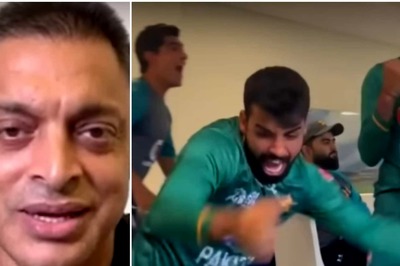
views
Vellore: The heartland of the backward Vanniar community of Northern and Western Tamil Nadu will see DMDK and PMK slug it out for electoral honours in the April 13 polls.
The community, which accounts for over 35 per cent of the population, was once considered PMK's vote bank. But the scenario changed after advent of DMDK, floated by actor politician Vijaykant, who weaned away Vanniar youth from PMK.
In the last assembly and Lok Sabha polls, DMDK had garnered a substantial vote bank in this area, leading to defeat of all PMK nominees. PMK, which contested the elections in the company of the AIADMK, has now aligned with ruling DMK.
Though DMDK and PMK will contest directly only in six constituencies -- in north and west, the increasing percentage of votes DMDK has got in the last two polls points to a tough fight in the Vanniar-dominated constituencies.
Despite the popular PMK slogan of 'Vanniar vottu anniyarku alla' (Vanniars will not vote for candidates of other castes), Vijaykant's maiden win over a PMK candidate from Vridhachalam in the 2006 polls, where Vanniars and Adi- ravidars are predominant, indicate DMDK is eating into PMK's vote bank.
Interestingly, the same PMK candidate who lost to Vijaykant in 2006 had triumphed in the previous assembly polls against a DMK candidate in 2001. This shows how DMDK has hijacked the vote base in the Vanniar stronghold since 2006.
Vijaykant's contest from Rishivandhiyam, also in north, this time shows DMDK's confidence in countering PMK's influence in the region. Rishivandhiyam voters have favoured a Congress candidate which had PMK in its alliance in the last two elections.
While DMK has allotted 26 of the total of 31 seats to PMK in the northern and western regions, K Malaichamy, former MP of AIADMK asserts, "We (AIADMK) are very strong in the west and we have DMDK in the north." DMDK contests most of its 41 seats from northern and western segments.
The DMDK that took off in 2005, secured 8.38 per cent and 10.09 per cent vote share in 2006 assembly and 2009 Lok Sabha polls respectively, while PMK has been on the winning alliance in the last two assembly elections.
The fact that DMDK has bagged 41 seats from the AIADMK alliance while long-term AIADMK ally MDMK was virtually shown the door shows how it has grown in strength in the last five years and has become a political force to reckon with.
On the other side, PMK was inducted into the DMK alliance in a similar manner even after it ruffled feathers with the ruling party between the assembly polls. Moreover, the DMK completing the seat-sharing exercise with PMK long before it did with Congress displays DMK's expectations from the PMK.
With the issues in the assembly polls being more local, snatching the sentiments in the Vanniar heartland from each other will be the contesting points between PMK and DMDK. At least largely for that reason alone both parties seem to have found a place in their respective alliances.
Vanniar community, right from the first general elections in 1952, had been returning its caste members to the assembly and Parliament.
The late S S Ramaswamy Padayachi, a prominent leader of the Vanniar community, along with late Manikavelu Naicker floated the Common Wheel party in 1952, which bagged a sizeable number of seats in the belt, denying an absolute majority to the Congress in the composite Madras State.
Even well-known newspaper magnate late Ramnath Goenka, as a Congress candidate, had to toil against little known Thirukural Munusamy at Tindivanam of the Common Wheel party to enter the Lok Sabha.
Late C Rajagoplachary, who was sworn in as Chief Minister after the then assembly polls, negotiated a deal with both leaders to 'create' majority for Congress in the house.




















Comments
0 comment